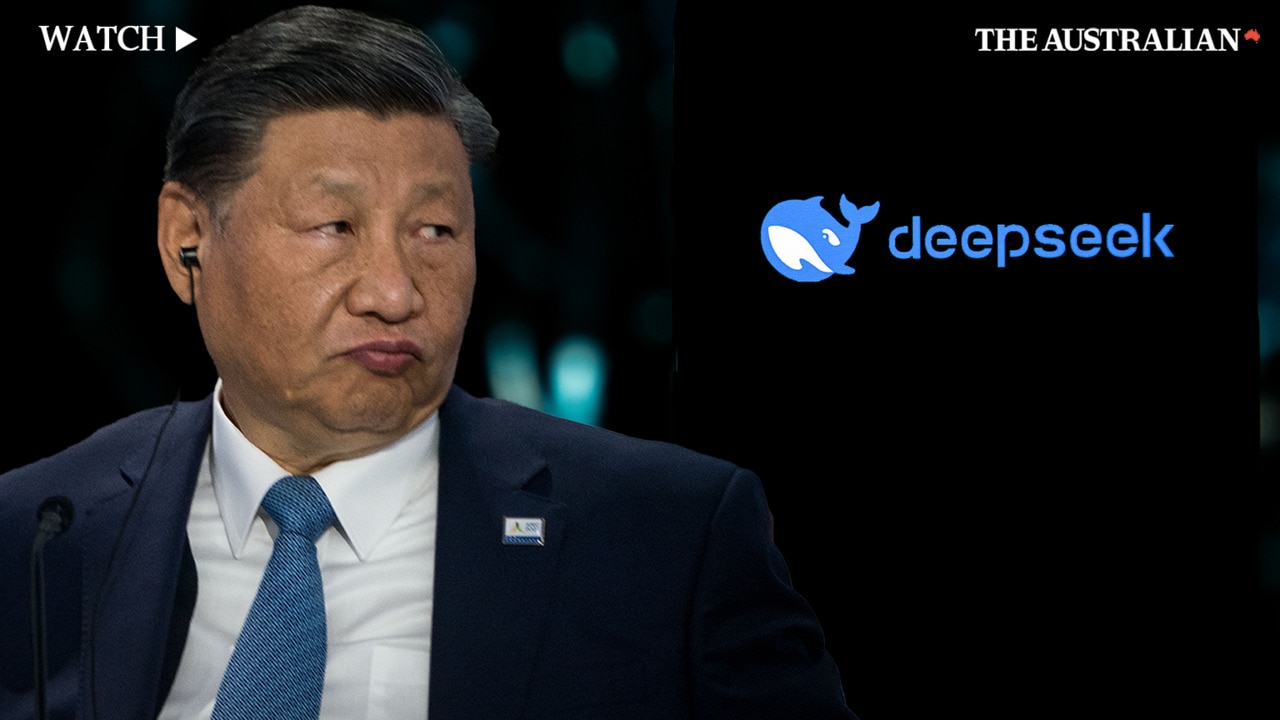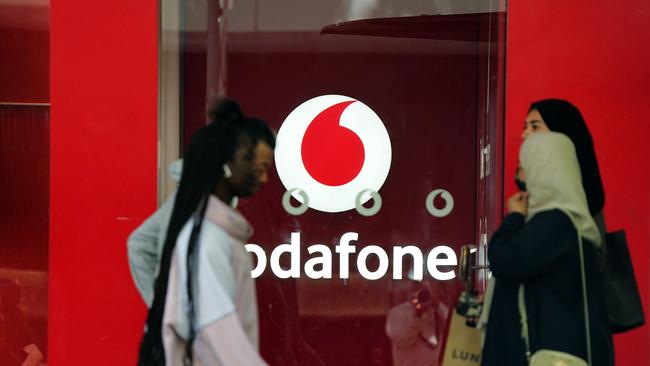DeepSeek hit with more bans as Australian companies tighten controls
Some of Australia’s biggest companies, including Commonwealth Bank, TPG and Optus are banning or snubbing China’s DeepSeek after intelligence agencies warned of an “unacceptable risk” to national security.

Two of Australia’s biggest telcos and other companies, including Commonwealth Bank, have joined the federal government by banning or snubbing China’s low-cost artificial intelligence model, DeepSeek, after intelligence agencies warned of an “unacceptable risk” to national security.
Vodafone owner TPG was the first Australian company to announce it was prohibiting employees from using DeepSeek and even urged them to not download the Chinese software – which adheres to Communist Party censorship laws – on their personal devices.
A Commonwealth Bank spokesman said “we do not use” DeepSeek and “have no current plans to do so”. Optus has banned the platform while Telstra said it was “limiting access” to China’s version of ChatGPT.
Other companies declined to comment publicly out of fear of being targeted by Chinese or “activist” hackers.
DeepSeek’s launch last week shocked global markets due to its ability to match America’s best AI models for a fraction of the cost.
But it has quickly become the target of bans as imposed on other Chinese tech companies, like TikTok – and Huawei which was barred from participating in Australia’s 5G rollout.
And it’s not just in Australia.
The Italian Data Protection Authority has said it blocked access to DeepSeek with immediate effect amid data-protection concerns. This was despite Microsoft and Amazon including DeepSeek on their respective AI market places for enterprise customers as Silicon Valley scrambles to maintain its dominance in the AI race.
The Italian watchdog said Hangzhou DeepSeek Artificial Intelligence and Beijing DeepSeek Artificial Intelligence, which provide the DeepSeek chatbot service, allegedly failed to reveal key details about the platform, such as what personal data is collected, the sources used, the purposes pursued, the legal basis of the processing, and whether they are stored on servers located in China.
TPG general manager of tech security Lee Barney said DeepSeek was prohibited not only at work but the telco wanted to discourage its workers using it privately.
“We have banned DeepSeek across TPG and are recommending our people to not use it in a personal capacity,” Mr Barney told The Australian.
“The speed of AI developments and how information is ingested and used needs to be met with a measured and cautious approach from both the public and corporate Australia.”
The Australian government banned DeepSeek from its systems and devices after intelligence agencies branded it an “unacceptable risk” to national security.
The use of generative AI apps has exploded following the launch of ChatGPT in late 2022. Companies have since warned employees against the dangers of using unauthorised or “BYO” technology to work.
Others have moved to lock down their data and prevent embarrassing breaches – like when a Samsung engineer uploaded sensitive internal source code to ChatGPT.
While NAB doesn’t have a list of banned apps, employees are banned from downloading unauthorised software on their work computers and phones. So tight are the controls that workers can’t even copy and paste text and images from the “NAB environment” to a rogue program.
A Telstra spokesman said: “Microsoft Copilot is our chosen AI tool for our people. There are privacy and security risks associated with any new AI tool and we have made the decision to limit access to DeepSeek”.
Optus banned access to the Chinese model on all of its devices and systems.
“The use of DeepSeek AI has not been implemented by Optus and access to the system has been blocked for all employees,” an Optus spokesman said.
Australian data centre giant NextDC’s chief, Craig Scroggie, wouldn’t reveal which technologies his staff had access to, citing cyber security.
“Security is non-negotiable. Public discussions on what we do and don’t use weaken our defences, which is why we only engage through secure, controlled channels with strict access controls,” Mr Scroggie said.

More businesses are expected to follow the government’s lead. Federal Home Affairs Minister Tony Burke said the government was moving quickly to protect Australia’s security and the national interest.
“AI is a technology full of potential and opportunity, but the government will not hesitate to act when our agencies identify a national security risk,” he said.
The government said the “decision is based on the risk and threat information from our national security and intelligence agencies. DeepSeek poses an unacceptable risk to Australian government technology”.
Armin Chitizadeh, from Sydney University’s faculty of engineering, said there were concerns that companies “might cut corners on safety”.
“DeepSeek’s introduction shook the world as a worthy opponent, raising important privacy and security concerns. The emergence of GenAI tools has introduced many issues, and I’m glad that DeepSeek’s arrival has created a wave of concern. People need to be more cautious when dealing with any GenAI tools,” Dr Chitizadeh said.
His colleague, Jonathan Kummerfeld, said the DeepSeek ban was a “prudent move”.
“We have no control over how data given to the chatbot is used. At the same time, it is important to note that Australia can benefit from the scientific discoveries underpinning DeepSeek. We can use those innovations to build our own systems, without the risks of using the chatbot service,” Dr Kummerfeld said.
There are fears DeepSeek could access and share customer data with the Chinese Communist Party under the country’s national security laws. There are also censorship concerns associated with the app, which refuses to provide information on subjects deemed unacceptable to the CCP, such as the 1989 Tiananmen Square massacre and human rights abuses in Xinjiang.
This is despite it able to provide information on the human rights records of other countries, including Australia which it labelled a “mixed picture”.
“As a democratic country with a strong rule of law, Australia generally upholds many fundamental human rights, but there are notable concerns, particularly regarding Indigenous rights, asylum-seekers and social inequality,” DeepSeek said when tested by The Australian.
DeepSeek could not even say who Chinese President Xi Jinping was, let alone whether he was a good leader.
“Sorry that’s beyond my current scope. Let’s talk about something else,” DeepSeek responded.
But Silicon Valley is eager to adopt some of DeepSeek’s innovations after it revealed that its model cost $US5.6m to train, compared with the billions of dollars US companies have invested. The big cost difference sent markets into a tailspin, with chip maker Nvidia among the biggest casualties last week.
“There are a number of things that they have, advances, that we will hope to implement in our systems,” Facebook founder and Meta chief executive Mark Zuckerberg said.
“Whether it’s a Chinese competitor or not, I kind of expect that every new company that has an advance event, that has a launch, is going to have some new advances that the rest of the field learns from and that’s sort of how the technology industry goes.”
Microsoft and Amazon have even made DeepSeek’s R1 model available on their AI marketplaces.
“One of the key advantages of using DeepSeek R1 or any other model on Azure AI Foundry is the speed at which developers can experiment, iterate, and integrate AI into their workflows,” Microsoft corporate vice president of AI Platform Asha Sharma.
“With built-in model evaluation tools, they can quickly compare outputs, benchmark performance, and scale AI-powered applications. This rapid accessibility — once unimaginable just months ago — is central to our vision for Azure AI Foundry: bringing the best AI models together in one place to accelerate innovation and unlock new possibilities for enterprises worldwide.”
Amazon said: “With AWS, you can use DeepSeek-R1 models to build, experiment, and responsibly scale your generative AI ideas by using this powerful, cost-efficient model with minimal infrastructure investment”.



To join the conversation, please log in. Don't have an account? Register
Join the conversation, you are commenting as Logout